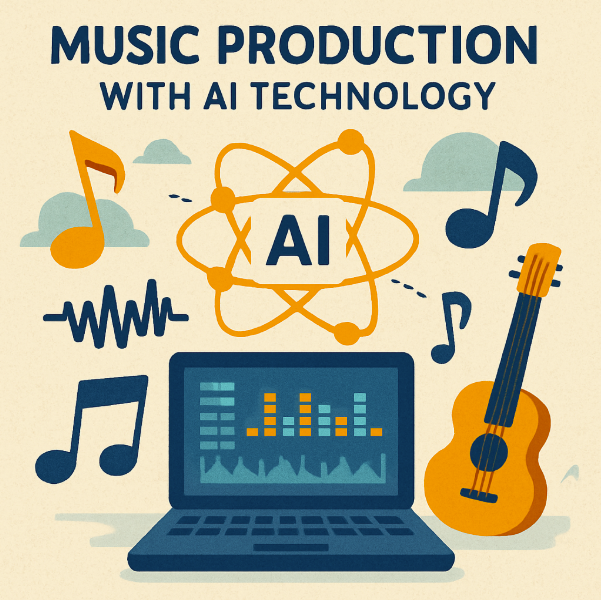AI’s involvement in music has grown exponentially over the past few years. From composing symphonies to generating entire albums, AI is becoming a formidable presence in the music industry. It acts as a co-creator, providing artists with unique tools and inspiration that challenge traditional boundaries. These AI-driven tools enable musicians to experiment with sounds and structures that were previously unimaginable, opening up a plethora of creative possibilities.
The integration of AI in music is not confined to creation alone; it’s also revolutionizing how music is experienced by audiences. By analyzing listener preferences and behaviors, AI helps tailor music experiences to individual tastes, making music more accessible and enjoyable. This personalized approach not only enhances the listener’s experience but also broadens their exposure to diverse music styles and genres.
AI Music Genre Transformation
AI’s ability to analyze vast amounts of music data allows it to identify patterns and trends across different genres. This capability has led to the creation of entirely new music styles that blend traditional elements with cutting-edge innovation. For instance, AI can mix classical music structures with modern electronic beats, creating a soundscape that is both nostalgic and futuristic. This fusion of genres enables musicians to reach a wider audience by combining familiarity with novelty.
AI-driven platforms like OpenAI’s MuseNet and Google’s Magenta have been at the forefront of this transformation. These platforms use machine learning algorithms to understand and generate music, offering composers new avenues for creativity. By leveraging AI, musicians can explore uncharted musical territories, experimenting with various sounds and structures to create something truly unique. This evolution in music creation is not only transforming the industry but also redefining what it means to be a musician in the digital age.
How AI Transforms Music Creation

AI’s role in music extends beyond genre creation. It also revolutionizes how music is composed, produced, and consumed. By automating mundane tasks and providing innovative tools, AI empowers musicians to focus more on their artistic vision and less on technical constraints, thus enhancing the overall creative process.
Composing with AI
AI tools provide musicians with endless possibilities. Artists can use AI to generate melodies, harmonies, and even lyrics. This doesn’t mean AI replaces human creativity; rather, it augments it. Musicians can experiment with AI-generated suggestions to refine their compositions, leading to unique and innovative outcomes. By using AI as a collaborative partner, musicians can push the boundaries of creativity and explore new musical landscapes that were previously inaccessible.
For instance, the British band Massive Attack used AI to analyze their entire discography, discovering patterns and themes they could leverage for future projects. Such insights enable artists to push creative boundaries and explore new dimensions of their music. This analytical approach not only enhances the quality of music but also provides artists with a deeper understanding of their creative processes, allowing them to innovate with intention.
Producing and Mixing
AI streamlines the music production process by automating tasks like mixing and mastering. This allows producers to focus more on the creative aspects, as AI handles the technical details. AI-powered plugins and software can adjust levels, balance frequencies, and even suggest improvements, ensuring high-quality production standards. By reducing the time and effort required for technical processes, AI allows producers to dedicate more resources to artistic exploration and experimentation.
Moreover, AI’s ability to learn and adapt means that it can continuously improve its processes, providing producers with cutting-edge tools that evolve alongside the music industry. This dynamic capability not only enhances the quality of music production but also ensures that artists remain at the forefront of technological advancements, enabling them to create music that resonates with contemporary audiences.
Personalizing Music Experiences
AI is also transforming how we consume music. Streaming services like Spotify use AI algorithms to curate playlists based on users’ listening habits, providing a personalized music experience. This not only enhances user satisfaction but also exposes listeners to new genres and artists they might not have discovered otherwise. By offering tailored recommendations, AI ensures that listeners are constantly engaged and entertained, fostering a deeper connection with music.
Furthermore, AI’s ability to analyze vast amounts of data enables it to predict trends and preferences, allowing music platforms to stay ahead of audience demands. This proactive approach not only enhances the listener’s experience but also provides artists with valuable insights into audience behavior, enabling them to create music that resonates with their target audience.
Challenges and Ethical Considerations
While AI presents exciting opportunities, it also poses challenges and ethical questions. The integration of AI into the music industry raises important considerations that must be addressed to ensure responsible and sustainable development.
Intellectual Property Concerns

One major issue is the question of ownership. If an AI generates a piece of music, who owns the rights? Is it the programmer, the user, or the AI itself? These questions are complex and require legal and ethical frameworks to address. As AI continues to evolve, the music industry must develop clear guidelines and regulations to navigate these challenges and protect the rights of all stakeholders involved.
The ambiguity surrounding intellectual property rights not only affects artists and programmers but also has broader implications for the industry as a whole. By establishing clear legal frameworks, the music industry can ensure that AI-driven innovation is fostered responsibly, balancing the interests of creators, consumers, and technology developers.
Quality versus Quantity
With AI’s ability to produce music rapidly, there’s a risk of prioritizing quantity over quality. The music industry must find a balance between leveraging AI for innovation and maintaining the artistic integrity that defines truly impactful music. While AI can generate vast amounts of content, it is essential to ensure that the music produced retains the emotional depth and creativity that resonate with audiences.
To address these concerns, the industry must prioritize quality over quantity, focusing on creating meaningful and impactful music that stands the test of time. By fostering a culture of creativity and innovation, the music industry can harness the potential of AI to enhance, rather than diminish, the quality of music.
Human Element in Music
Music is deeply personal and emotional. While AI can replicate styles and compose melodies, it lacks the emotional depth and human experience that often resonate with audiences. Therefore, the role of human musicians remains irreplaceable, as they bring the soul to music that AI cannot replicate. The emotional connection between musicians and their audiences is a fundamental aspect of music that cannot be replaced by technology.
By embracing AI as a collaborative partner rather than a replacement, musicians can enhance their creative processes while preserving the human element that defines music. This harmonious collaboration between human creativity and AI technology ensures that music remains a deeply personal and meaningful art form.
The Future of AI in Music
The future of AI in music is both promising and uncertain. As technology advances, AI will continue to evolve, offering new tools and opportunities for artists. However, the industry must navigate the ethical and practical challenges to harness AI’s full potential responsibly. By fostering a collaborative and innovative environment, the music industry can embrace the opportunities presented by AI while addressing the challenges it poses.
Collaborative Innovation
The key to a successful future lies in collaboration. Musicians, technologists, and policymakers must work together to create an environment where AI can thrive while respecting the artistic and ethical standards of the music industry. By fostering a culture of collaboration and innovation, the music industry can ensure that AI-driven advancements enhance, rather than undermine, the creative and artistic integrity of music.
Furthermore, by establishing clear guidelines and regulations, the industry can navigate the challenges posed by AI, ensuring that its potential is harnessed responsibly and sustainably. This collaborative approach will not only drive innovation but also ensure that the music industry remains a vibrant and dynamic space for creativity and expression.
Expanding Creative Horizons
AI will undoubtedly expand the creative horizons of music, introducing new styles and genres that blend technology with tradition. Artists who embrace AI as a partner rather than a competitor will find themselves at the forefront of this musical evolution. By leveraging AI’s capabilities, musicians can explore new creative territories and push the boundaries of what is possible in music.
As AI continues to evolve, it will enable artists to experiment with new sounds, structures, and styles, creating music that resonates with contemporary audiences. This dynamic and innovative approach ensures that the music industry remains a vibrant and exciting space for creativity and expression.
Conclusion
AI is reshaping the music industry in profound ways, offering exciting possibilities and new challenges. By understanding and embracing these changes, industry leaders can leverage AI to drive innovation and creativity. While the journey is complex, the fusion of AI and music promises a future rich with new sounds, experiences, and opportunities.
As we move forward, the harmonious collaboration between human creativity and AI technology will define the next chapter of music evolution, inviting us all to listen, learn, and innovate together. The future of music is bright, and by embracing the potential of AI, we can ensure that it remains a dynamic and exciting space for creativity and expression.




